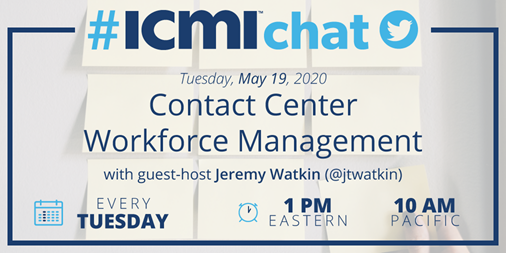By
The Editors
|
Date Published: May 13, 2020 - Last Updated September 08, 2020
|
Comments

As contact centers around the world scrambled to adjust to working from home, we've done so with the intention of one day returning to our offices. However, working from home has unique upsides for agents and employers alike. For some teams, the "new normal" might be worth keeping, but leaders will need to be thoughtful in making that determination.
Join us on Tuesdays at 1 p.m. Eastern, 10 a.m. Pacific to weigh in on the contact center industry's most pressing challenges. Next week, we explore "Contact Center Workforce Management." A question preview follows this article.
This week, we asked the #ICMIchat community to share their experiences working from home and observations to answer the question: "should we ever go back?" It's a mixed bag, but for the right agents and organizations, working from home is the best course of action.
Building Personal Connections
While working from home offers some wonderful advantages, building personal connections among remote colleagues is not one of them. Face-to-face interactions will always be the most vibrant form of communication, and it's challenging to make up for the unplanned interactions that tend to happen around the watercooler. Strategies to overcome these setbacks exist, but they require deliberate actions by the entire team. As a leader, be sure to facilitate connections that aren't just about work projects.
I can't imagine life without video meetings so I'm grateful we have that. But I'd love to share a meal with my team at some point and meet more of my new colleagues in person.
The shift. My team wasn’t remote before. So we all bonded really well and have been friends, not just coworkers. It’s hard to “map” our real world quirks to the online version of ourselves!
My team has struggled with the social isolation. Trainers are social creatures. I created a virtual water cooler, share pics of my cat, and post videos a few times a week but it is not the same.
Work From Home Ready
Some personalities, work activities, and employers are particularly suited to work from home environments. However, it's not the perfect fit for every team. When considering whether maintaining work from home is right for you, it's crucial to evaluate both the types of tasks your team performs as well as employees' personalities and communication styles.
The more task driven the team the better for remote work. I work in hospitality and we have a huge amount of the workforce whose jobs can not be remote.
My team is pretty self-directed and leans toward introversion. Easier for them to make the transition, I think. I, on the other hand, am talking to my dog more than ever.
While some teams may be more suited temperamentally to remote work than others, it's less a question of innate attributes than of employer support in setting up conditions for effective remote work. It should NOT be "remote work is just work-at-work, but in exile."
Communicate, Communicate, Communicate!
Communication is often one of the most commonly cited hurdles to organizational harmony, and a remote workforce only makes effective communication more challenging. It's vital to consider not only leadership's ability to communicate down, but we must also consider our team's ability to communicate up and horizontally. Strong writing skills and high levels of emotional intelligence are necessary to thrive in a remote workplace.
Remote teams are successful if they're good at communication. Knowing when to use email vs chat and how soon to expect a response help teams stay connected. Teams benefit from using different apps to chat around the "water cooler" or share info about a project.
Managing a remote team? Have a daily check-in, Communicate regularly, Take advantage of technology, Manage expectations, Focus on outcomes, not an activity, Resource your team
Mentors must seek out team members and coach them actively. Performance must be assessed with additional context. It is okay if you can’t reach some people sometimes. Everything will be fine.
I'm no expert on processes, methodologies, or mgmt disciplines that help remote teams, but I do know one thing: There must be authentic, practical & frequent #coaching going on. Not lip-service "coaching," but the legit kind that helps ppl get better at their jobs.
People Problems
Difficult discussions are challenging enough face-to-face, and many managers are already inclined to shy away from potential conflict. However, addressing concerns head-on is vital to the success of a remote workforce. It's also critical for leaders to trust in their teams' ability to work without direct supervision. On the bright side, embracing a remote workforce also expands an organization's access to talent.
I remember when I first started remote work there would be times we'd say, "Well next time you're in the office let's talk about this." It's hard to move past that but it's possible. I sure don't miss commuting!!!
The best part of remote work connecting the most fantastic talent in the world with the best companies..no longer bound by a 50 mile radius. The worst part is not getting to see all the amazing people and hang out with them.
Culture Concerns
If your culture was already on shaky ground, remote work might not be for you. Building a robust and consistent culture in contact centers is critical to employee wellbeing, performance, and customer experience. In remote environments, we must take particular care to promote and reinforce our culture to maintain it.
For NTI, the best part of running a remote call center is low attrition and agent satisfaction. We hire disabled Americans who need the accommodation of working at home. We've been doing this since 1995 and we’ve found solutions that make our agents successful!
I think it's too early to tell in our case. We've all adjusted in the short run because we have no choice. Once we have an option again, we'll have to get much more intentional about building a WFH culture that works.
This is a mixed bag for sure. But I think in more general terms there is a risk of losing culture. There needs to be a conscious decision to maintain #culture in a WFH environment.
For the most part our team doesn't feel ready to go back. There are SOME that can't wait to be back. I think it's forced us to be more formal in our approach to connecting in a meaningful way. If it hasn't forced that for you...connectedness may be degrading
Working From Home Actually Works
Our community is highly experienced working remotely, and many of us can personally attest to the productivity boost that comes with getting out of the office. However, there are some special considerations when it comes to helping teams thrive, and leaders need to be aware of these when planning the future of their work.
Working from home has deepened one of my opinions about work teams, remote or not: you can discern a healthy work culture very easily, just as you can discern an unhealthy one, too. You can easily tell when employees are discouraged or RIP (Retired In Place).
We already had a significant wfh program. So, I don't think it's made significant change to my opinion. I do think, however, it helps to understand the pros/cons of wfh and think about how to improve the way you lead/manage a remote team.
I’ve learnt how hard it is in a remote set up to do the basic things we all take for granted in an office set up. It takes a lot more effort to just bring about the team spirit!
Workforce Management Wins
You may think that corralling a bunch of agents into schedule adherence would be more difficult when you can't be with them, but many workforce managers and seeing benefits to having employees at home. Not only does it reduce employees' effort to adhere to schedule and eliminate nasty commutes, but it also gives them the flexibility to work shifts that would never be possible when a trip to the office was required.
It sure makes it easier to get shifts covered. It also challenges leaders to get their metrics and reporting in place so they can actually monitor that agents are being productive.
This very much depends on the organization and your team. It opens up the potential of more scheduling options. Split shifts and short notice shifts may become much more reasonable if you aren't driving to the office.
I'm going to need a new reason code for "my kid just trapped a squirrel"
When You Go Back
If your team decides to return to work in an office, make sure that the office is ready for them! Of course, there are health considerations to working together again. Don't forget about equipment changes, upgrades, and replacements that may have been deferred. You may also find it necessary to adjust scheduling practices in the near-term to accommodate today's reality.
It will be important to remember the trauma they have endured and the grief they may be experiencing. Make space for these things. Pretending they don't exist is not a strategy.
We are not opening the same business we closed. Our employees have faced some massive hardship during this. We must take it upon ourselves to be conscious of their history and fully engaged in developing their future.
#ICMIchat May 19, 2020
Contact Center Workforce Management
Join guest-host Jeremy Watkin next week as he guides the discussion about contact center workforce management best practices. We hope you'll join us next Tuesday for a stimulating conversation.

Q1: What's the purpose of workforce management (WFM) in the #contactcenter?
Q2: What's your philosophy around agent scheduling?
Q3: What impact does WFM have on agent attrition and engagement?
Q4: How do you define schedule adherence and explain its importance to #contactcenter agents?
Q5: What's required to monitor real-time adherence? What about remote agents?
Q6: What information is required to create accurate workload forecasts in the #contactcenter?
Q7: What WFM metrics are essential for contact centers to track?
Q8: What impact does WFM have on the customer experience?
Photo by kate.sade from Unsplash.